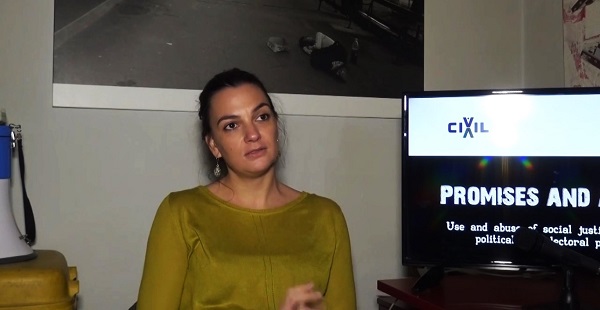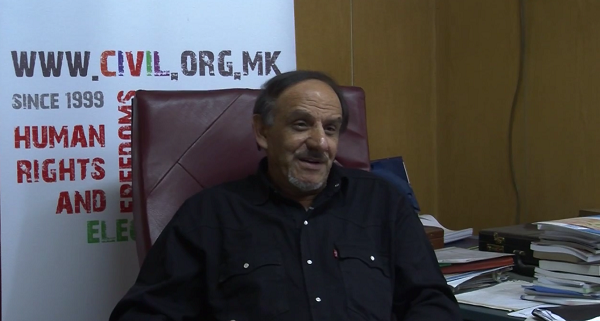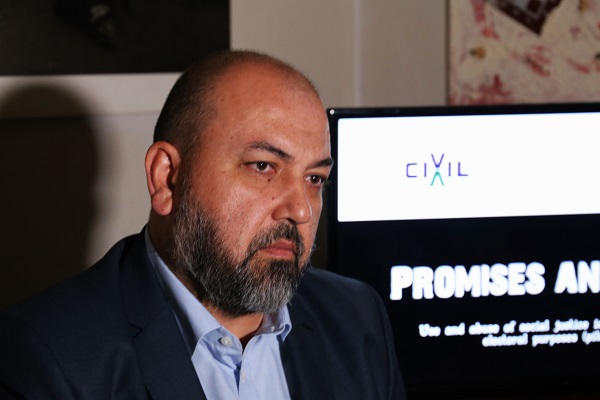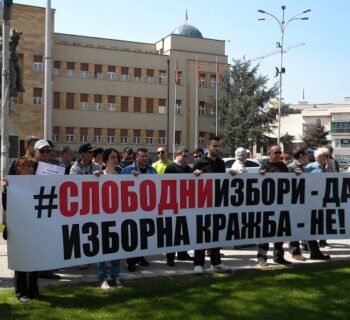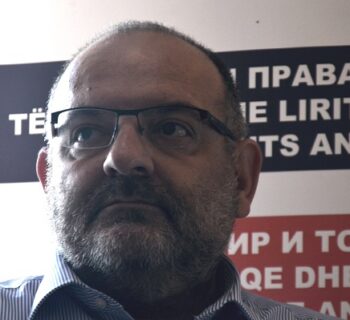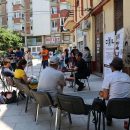“I believe that after being ten years in power, that VMRO-DPMNE practically have no credibility to promise anything of whatsoever... 1.2 million citizens of Macedonia barely make ends meet! All surveys on public opinion show that even unemployment is not the biggest problem for citizens anymore, as is the quality, or standard of life. The fact is that even those who are employed in Macedonia, live poorly!”, says Kalinka Gaber, Program Director of the Institute for Social Democracy "Progress" in an interview for Civil Media.
CIVIL Media: Are the socially disadvantaged categories in Macedonia abused in a political or electoral context? What are your realizations and analysis?
GABER: Before I answer affirmatively to your question, I would just like to give you a little perspective of the context in which we live in Macedonia today. And the fact that despite the numerous articles in the Constitution that define Macedonia as a social state, the reality on the ground suggests that the country, especially in the past eight years, has not undertaken measures that are constitutionally noted. Hence, a large number of various target groups in the state are being used, that is, their substandard social position is abused for promoting certain views, positions and are taken advantage of for political and, because of the context, also for electoral purposes. I will argue on whether the state actually cares and has the obligation of offering social protection and social security of citizens, according to the principle of social justice, or that every employee is entitled to an appropriate compensation, as provided in Article 32 of the Constitution. We have a number of categories in the country whose situation is abused. Here, above all, I would like to primarily speak about the unemployed, but also the workers, retirees and especially the young people.
All these categories of citizens, including those who are beneficiaries of social assistance, who are at the very margins of society, have been seriously abused in the past several years, through numerous measures that are marketed as ones with which the authorities and institutions are trying to enhance their conditions. In fact, their difficult situation is being abused for political and pre-election purposes. Now, here we can speak of a number of measures, starting with the health spas and free transportation for pensioners, through the exploitation of workers and the leveling of the amounts that welfare recipients receive, to the fact that the young people have been "elegantly" deleted from the lists of the unemployed, only to falsely reduce the number of unemployed people in Macedonia. It is important to emphasize that all of these categories of citizens do not enjoy the protection that is guaranteed by the Constitution! For example, pensioners cannot be treated as a social category, they are an economic category, they are people who have earned their entire lifetime and have certain rights they should enjoy, whereas this state treats them as a social category. They always receive some increases before elections. Even though it is just fabricated, propaganda manipulation. Recently, for example, we received information that the Employment Agency of the Republic of Macedonia has been abusing those who are on the unemployment lists. You know how they are supposed to register themselves ...
They invite them to trainings, but we have serious information that the unemployed have to attend those trainings in order to maintain their status as unemployed, and in order to be able to enter the lists that are offered to employers! But at these trainings they receive information on what the election program of the ruling party is offering! This again is manipulation of social groups and people who are socially disadvantaged for pre-election purposes.
CIVIL Media: Which promises for social justice are realistic, and which promises are a kind of political corruption, or are playing with the expectations of the voters?
GABER: Look, I believe that after being ten years in power, that VMRO-DPMNE practically have no credibility to promise anything to this category of citizens. Figures show that about 180,000 citizens of Macedonia live on less than 14 denars per day, 90,000 citizens live on 22 denars per day, and about 1.2 million citizens barely make ends meet! All surveys on public opinion show that the biggest problem for citizens is not even the unemployment anymore, as is the quality, or standard of life. The fact is that even those who are employed in Macedonia, live poorly! All of it is a result of ten years of bad economic policies. One should be noble and admit that the economic model of flat taxes, extra fees for foreign investors, and various manipulations of certain categories of citizens, do not produce results. Therefore, I seriously think that everything we will hear from the ruling parties in this pre-election period, should be taken with a serious dose of reserve, because credibility has been lost.
Macedonia needs new energy and that energy is fueled by the real situation on the ground, on the one hand, but on the other hand, also by the fact that in recent years, serious organizations have been speaking very loudly and very powerfully on what is happening on the ground and what the state institutions did not want to see. It makes me very pleased to see that these voices, these analyses and recommendations that certain civil society organizations have given in recent period, have somehow, found their place, primarily in the public sphere. On the other hand, there are political parties that will participate in the electoral process, which have integrated and accepted such analysis and recommendations in their election programs. Therefore, in Macedonia, the discourse has already changed in some way, which is normally triggered by the catastrophic situation in which the Macedonian citizen lives in. We can already hear that political parties have started talking about topics such as quality of life, decent work, paid labor, quality at the workplace and the labor market, about education which again is linked to social justice and with the way in which labor should be marketed... These topics are dominating across the political discourse of the political parties, and I am optimistic of what is to follow. I think that there is strengthened awareness that will encourage political parties to approach citizens a little more responsively. And precisely because of the awakening of citizen awareness, I expect citizens to be stronger in seeking their rights.
CIVIL Media: What are the social and political consequences from abusing the issues in the area of social justice?
GABER: I would say that we went through that moment when the right to life became more a matter of survival than living a quality life! So, those who had the power, managed to impose and squeeze citizens in the molding within the framework of their expectations or policies! In my opinion, bad policies. Because of the high level of poverty in the country, we have silent citizens. That is the manipulation that is so terribly difficult! If existence is linked to the holders of political power, but also to the decisions in the political sphere, if the state is the biggest employer, if everything depends on budgetary subsidies, either at the central or local level, then we have silent citizens that, naturally, for existential reasons, are frightened to oppose those who are making the decisions, because their existence is at stake. Obviously, things have become unbearable! We have circumstances and situations in our country, which I think gives some impulse even to those citizens who have long been silenced, to resist and fight.
CIVIL Media: What can and what should the institutions, political parties, unions and civil society do in order to prevent the abuse of socially disadvantaged categories, and overall the topics in the area of social justice in the political and electoral context?
GABER: First and foremost, I think that only organized and united citizens, unions and stakeholders can be a trigger for changes, in putting a stop to this abuse of socially disadvantaged citizens. Strong unions that would protect workers' rights. Strong civil society organizations and informal groups of citizens, who would be the voice of those who are marginalized and who would make constant pressure on decision makers, are the ones who can seriously shift things. In addition, we need to be aware that corruption and poverty go hand in hand, and citizens must be encouraged to start reporting abuses and corruption that are happening at the national or local level. We in Skopje, are living under some kind of glass bell. We realize how serious things are, but we have not felt a tiny bit of that on our own skin, in the manner and to the extent it has been in smaller towns, where mechanisms for control and abuse of socially disadvantaged citizens are much stronger. So, I think that this story should be decentralized a little, in order to reach in every, even smallest pore and cell of Macedonian society. We must build and strengthen awareness on the social cost of corruption, because the fight against corruption also means a fight for rescuing and pulling out these socially disadvantaged citizens from the abyss.
 CIVIL – Center for Freedom is implementing the pilot project “Promises and Abuses”, which deals with abuse of social justice for political and electoral purposes. The goal of the project is to contribute to the strengthening of public awareness on abuses in the sphere of social justice in the electoral context, as well as to prevent manipulative practices of the political centers of power. The project is implemented in cooperation with the Heinrich Bὅll Foundation – Office in Sarajevo
CIVIL – Center for Freedom is implementing the pilot project “Promises and Abuses”, which deals with abuse of social justice for political and electoral purposes. The goal of the project is to contribute to the strengthening of public awareness on abuses in the sphere of social justice in the electoral context, as well as to prevent manipulative practices of the political centers of power. The project is implemented in cooperation with the Heinrich Bὅll Foundation – Office in Sarajevo
This post is also available in: AlbanianMacedonian
 Македонски
Македонски Shqip
Shqip English
English
